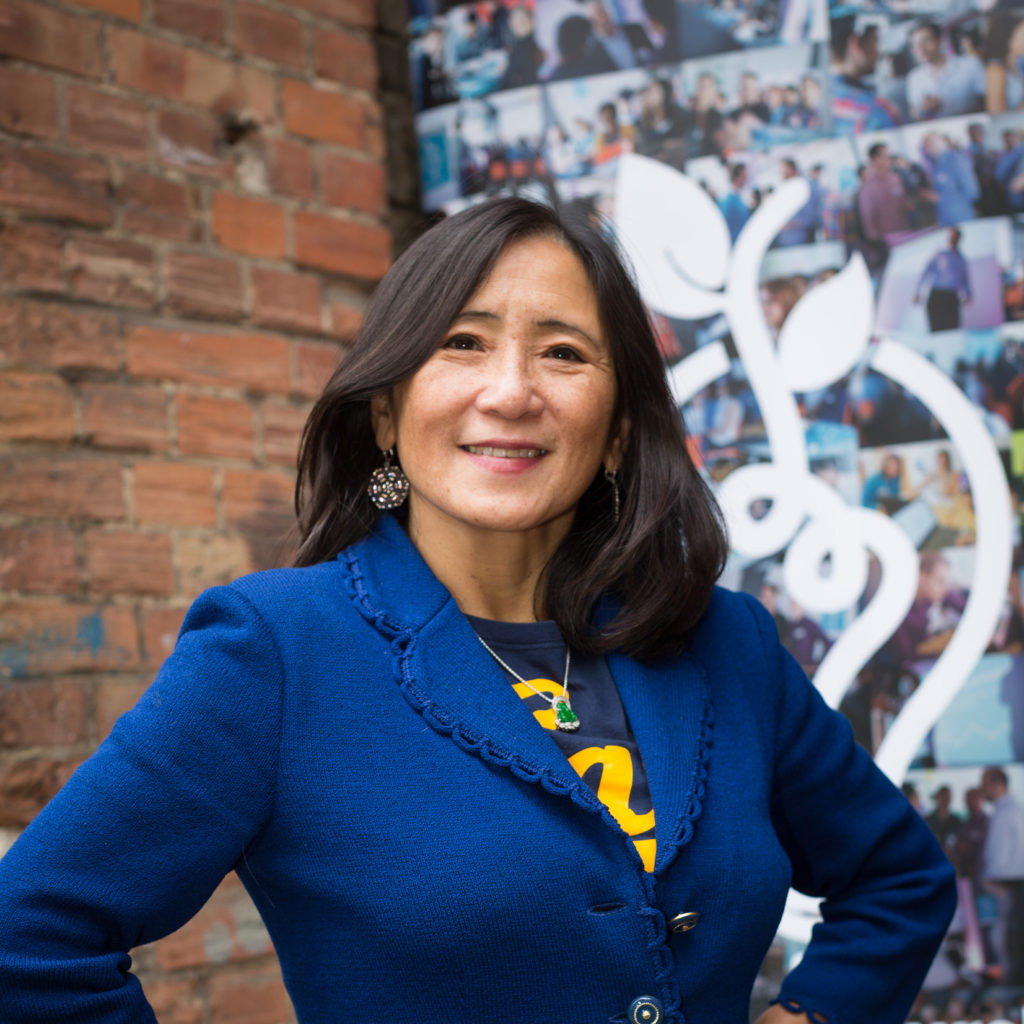This I know for sure: It’s important to Always Be Creating Value (ABCV)
When I was two years old, my mother, baby brother, and I flew to America from Taiwan to join my father who was already there working to obtain his graduate degrees. Two more kids came in rapid succession before my father completed his Ph.D. course. It was fun for the kids, especially when we piled up in our little red wagon to go the park, but perhaps it wasn’t as much fun for my parents. They needed help. Tag, I was it! As the oldest child, my job was to help take care of the younger kids and to be my mother’s translator, as she didn’t learn English until I was 10 years old. My parents would say, “You need to pay attention, and see if something needs to be done, and just do it. Don’t wait for to be told.”
As a teenager, I was popular as a babysitter in the neighborhood because I knew how to take care of little babies (my youngest brother was born when I was 13). After putting the neighbor’s children to bed, I looked for extra things to do like washing the dishes and picking up around the house. The parents of the children often paid me extra because I did more than they had expected. With my babysitting money, I bought many of the “extra” items that I wanted that my family couldn’t afford, like contact lenses ($300 a pair back then), skis, and other things.
Fast forward, as an upper-classman engineering student at Stanford University, I saw how hard it was for entering freshmen, especially those from inner city public schools, to compete with the ones from privileged backgrounds. I volunteered to mentor these students and was instrumental in getting the university to set aside a dedicated space at the Engineering School where these and other students could study. I was so used to helping others that I was surprised when I received the “Dean of Engineering Service” Award at graduation. It turns out that my parent’s advice to stay on the “look out for ways to create value” made an impression on me and served me well when I heeded it.
Over time, I realized that there are nuances around creating value. A positive one is the joy that is derived from giving value. If you enjoy helping others around you, especially those in need, such as a little old lady needing help to put her luggage in the overhead bin, your reward is the gratefulness in her eyes. When you lend a hand in this way, you are in control of that portion of your happiness that comes from creating value by serving others. This is in contrast to others who rely of external praise as a source from which to derive happiness. I fall into the former category and try to instill my value system into my sons so that they too can be in control of their happiness by ensuring that a major portion of it comes from creating value for others.
On the flip side, creating and giving value needs to be a two-way street to be sustainable. I’ve been in relationships with partners where my instinct was to keep giving to show my love, and when over time, I realized that the other person had not been giving much back to me, I felt unsatisfied and even resentful; inevitably, such relationships would end and the other person would be surprised. To avoid such surprises, it’s important to communicate at every stage in a relationship that it must be reciprocal and that everyone needs to give and take value.
This holds true in a business relationship as well as in a personal one. In business, I have come to realize that those who do not expect and demand reciprocity are held in lower esteem. If you just give and give and expect nothing in return, you are considered a fool, as I learned when I started my consulting company in mid-2000’s. Our focus was on helping start-ups in Silicon Valley with their marketing strategies. One of my best friends, who was an investor, asked around about what people thought of me. She was told that I wasn’t that smart. She shared that finding with me and I was shocked because some of those who had communicated that message to her were some of the very people I had helped. The investor then clarified the situation and explained that yes, I was very smart about marketing, but I considered was dumb about business and the proof of that was that I had helped those people for free and had never asked for any remuneration despite the lengths I had gone to help them. Wow.
Now, as I deliver entrepreneurship and innovation programs around the world, a major theme of my teaching is about “creating and exchanging value.” I also underscore that every start-up needs to have a compelling value proposition to succeed.
A major step is to understand the market and the customer: “What are their needs and problems and how can a solution be created that is valuable in meeting their needs and solving their problems?”
Understanding the marketplace and the customer is not as easy, however. A perfect example is found in a story from the 1960’s that involves General Mills. This company’s research led it to the conclusion that Japanese love sweets and assumed that Japanese housewives would therefore eagerly embrace the cake mixes that it produced. To the company’s surprise, its major Japan cake-mix marketing campaign was a resounding failure and no one bought the cake mixes. Little did the firm know that Japanese kitchens did not have ovens so the housewives didn’t have the equipment to bake cakes. Thus, while the company had done some research, in this case, just enough to identify the need, but they hadn’t done enough to understand how to meet the need in the environment.
How you are attempting to “create value” matters. Product market-fit is about understanding the customer and building a solution that has value because it appropriately fills a gap and meets a need. Entrepreneurs who are successful create the “right” value. Perhaps there is no better example of this than that of Steve Jobs. Believe it or not, he often visited the Apple store that was located a few blocks from his home in Palo Alto, California. While there, he observed customers at great length. From his observations and interpretations of them, he realized that older people were intimidated by computers and laptops. Having spotted this “need”, he spent several years designing the iPad in a way that would meet such needs. It’s no accident that the iPad was a success from the outset; it was designed for success.
Creating the “true value” starts with having the “right” mindset. Such a mindset seeks to create value as broadly as possible, not just by providing a single product or service. The notion of creating “broad” value entails seeking to create value for all stakeholders in a value chain. Andrew Mason, for instance, who is the founder of Groupon, is an excellent example of an entrepreneur who created “broad” value. He designed Groupon to create value for consumers, merchants, employees, investors, and even for himself. This “360 value” creation perspective helped Groupon reach a billion dollar valuation in less than two years, making it one of the fastest start-ups to do so.
I know for sure that to be successful in any size business, it is incumbent upon entrepreneurs to embrace the notion that they must Always Be Creating Value in all that they do. When they adopt this mindset in business, and in their personal lives, they will not only be successful in business, they will also be happy as human beings.
This excerpt is from the new book 33 Gems – Wisdom for Living Pieces of Life’s Puzzle
***
About Gigi Wang
Gigi Wang runs a consulting firm, MG-Team, LLC, which delivers entrepreneurship and innovation programs, and services for international business development globally. She is also an Industry Fellow & Faculty at UC Berkeley Sutardja Center for Entrepreneurship where she teaches a start-up boot-camp and executive innovation programs. She advises and mentors dozens of start-ups from around the world. Clients have included SAP, Amsterdam Center for Entrepreneurship, Grupo Aguia Branca (Brazil), NATO, Ecole d’ Ponts Business School, Japan External Trade Organization (JETRO), SRI International, Verizon Wireless, Lagardere and numerous universities and global incubators.
Before starting up MG-Team, Ms. Wang was on the executive teams of a number of tech start-ups in wireless, software, hardware, and services. As an Internet pioneer in the 90’s, she started up Pacific Internet in Singapore (IPO on NASDAQ in 1999) and launched the internationally renowned TRUSTe Internet privacy program in 1996.
Gigi holds BS and MS degrees in Mechanical Engineering from Stanford University where she was President of the Tau Beta Pi Engineering Honor Society, and a MBA from the Haas School of Business at UC Berkeley. She is a frequent speaker at entrepreneur and innovation conferences around the world including the World Investment Conference, Food Executive Europe, Silicon Valley Comes to the Baltics, IBM Global Start-Up Camp, and Global R&D Conference. As a child, she first emigrated from Taiwan, to Canada (Nova Scotia), then to US, first to North Dakota and then to Michigan where she grew up, before moving to California for college. She has two sons, Max (25) who is an engineer, and Zac (21) who is studying physics in college. Gigi has been playing co-ed soccer for over 25 years, and recently taken up golfing. She and her partner, John, live in the Bay area and love to cook cuisines from around the world for their family and friends.
For questions, you may contact Gigi at Gigiwang@berkeley.edu.


